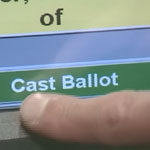2006年VOA标准英语-Electronic Voting Machines Under Scrutiny(在线收听)
By Paul Sisco
Washington, DC
03 November 2006
watch High Tech Voting Machines
Political elections are just days away in the United States, and more than a third of the votes cast will be done so electronically. This has many people concerned about voter fraud, machine failures and the repetition of problems in past elections.
 |
| Electronic voting machines use touch screen technology |
Television ads -- positive and negative -- are a regular part of U.S. elections, just like speeches, handshakes, and endorsements.
And in the voting booth, increasingly, electronic voting machines are too. About one third of voters will use them this election. Problems with traditional ballots, such as in the 2000 presidential elections when the so-called "hanging chads" on punch card ballots in Florida caused controversy, laid the ground work for electronic voting machines. And their use has increased steadily since they were introduced in 2002.
Electronic voting is meant to solve those problems -- and to make the process easier, faster and more democratic. But there have been problems with the machines as well. At Princeton University, Professor Edward Felton used a mock election to demonstrate how machine tampering could easily and dramatically change results.
Many states do not require a paper record from the machines, making recounts slow and almost impossible. Other problems in recent primary elections included miscounts, frozen machines, and missing memory cards.
Diebold Incorporated, the biggest maker of voting machines, says the problems have been taken care of. Marketing Director Mark Radke says, "In this case I just touch next to the person's name on the ballot It allows me to vote for that particular person, and I cannot not over-vote on that ballot."
Not all agree, such as Cyber Security consultant Stephen Spoonamore. "There is no electronic system in the world that cannot be hacked."
Problems prompted one candidate to tell his state's voters to use absentee ballots -- and leading many to believe the integrity of electronic voting systems is an issue for this election too.